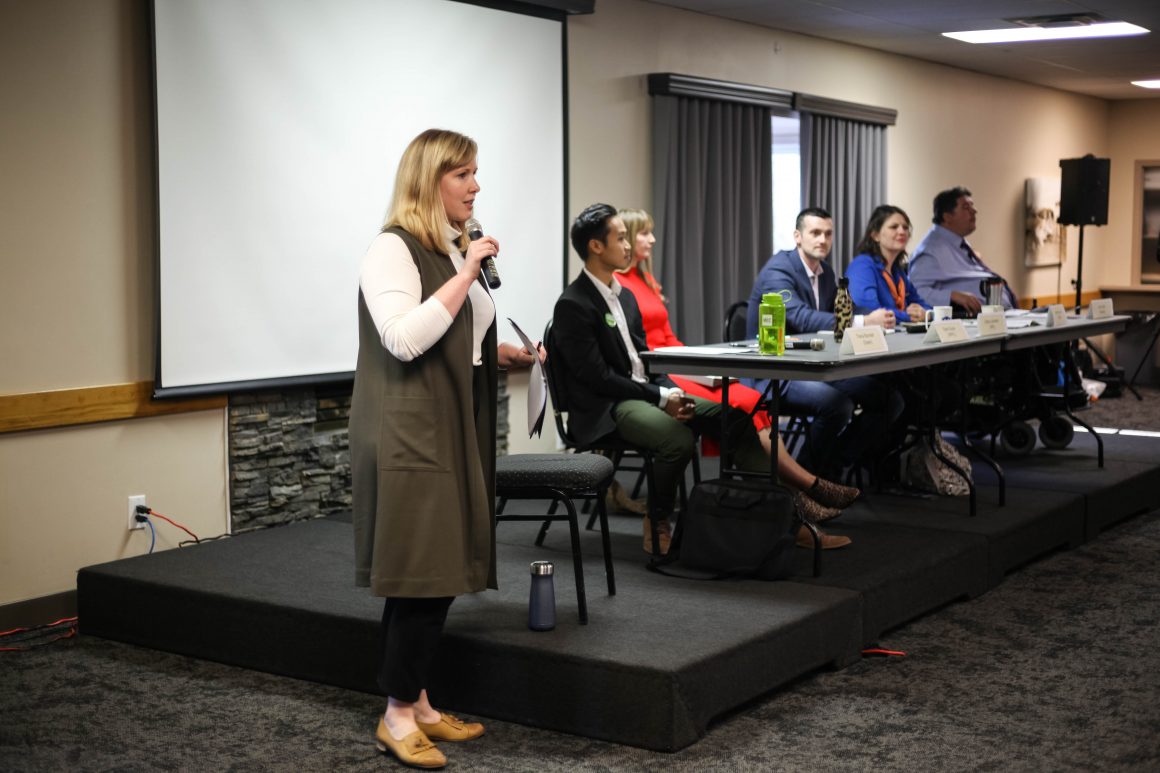
100 Debates on the Environment – Calgary Centre candidates forum
By Nikayla Goddard October 4 2019 —
On Thursday, Oct. 3, non-partisan all-candidates debates took place across Canada, focused on inspiring conversation around the environment and climate change action. The Calgary Centre riding welcomed five candidates to the Marda Loop Community Association centre to engage in friendly debate about what their parties, if elected, would do to contribute to climate change action. The five participants included incumbent representative Kent Hehr (Liberal), Jessica Buresi (NDP), Thana Boonlert (Green), Chevy Johnston (PPC) and Eden Gould (Animal Protection Party of Canada, APPC). Conservative representative Greg McLean was invited but declined attending.
The forum was hosted by Engineers Without Borders Calgary Professional Chapter, Calgary Climate Hub and Global Shapers Calgary. Megan Wilcox, a journalism professor at Mount Royal University, moderated the debate. The evening was split into five segments: introductions from the candidates, four questions about the environment, one question for open debate, questions from the crowd and finally concluding remarks.
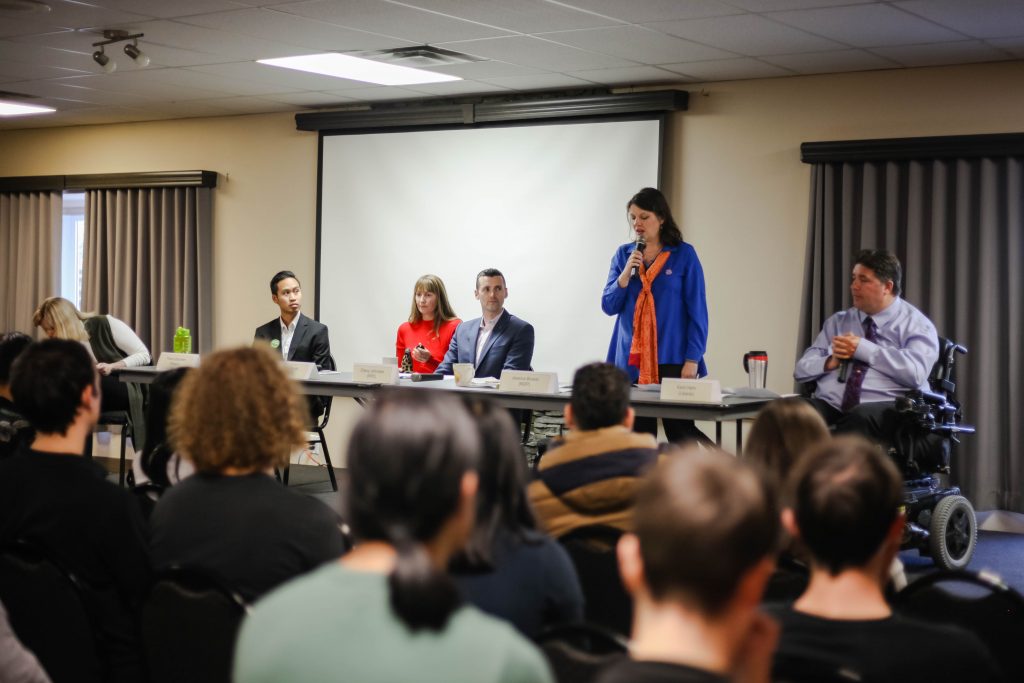
Photo by Mariah Wilson
Opening Remarks
Opening remarks for all candidates focused on why conversations about the environment are important, especially between political representatives and their constituents.
“The environmental and climate change movement is the most important issue of our time,” Boonlert said.
Gould recounted how the APPC believes that one of the best solutions to addressing climate change comes from a change in diet — switching from animal-based products to plant-based ones, and adopting veganism wholeheartedly.
Johnson addressed his experience with both sides of the debate, having been a part of the agriculture and oil industry but also considering himself an environmentalist.
Buresi, inspired by her time in Sweden and their state of environmental awareness, brought that perspective to the NDP, who she says are very committed to addressing climate change.
“We need to change the way we operate, and move towards more collectivism,” she said.
“It is a real and present danger,” Hehr remarked. “Not only to us in this room, but it’s a climate emergency throughout the planet.” He added that the Liberals have a “real” climate change plan that is “achievable” and based around pricing pollution.
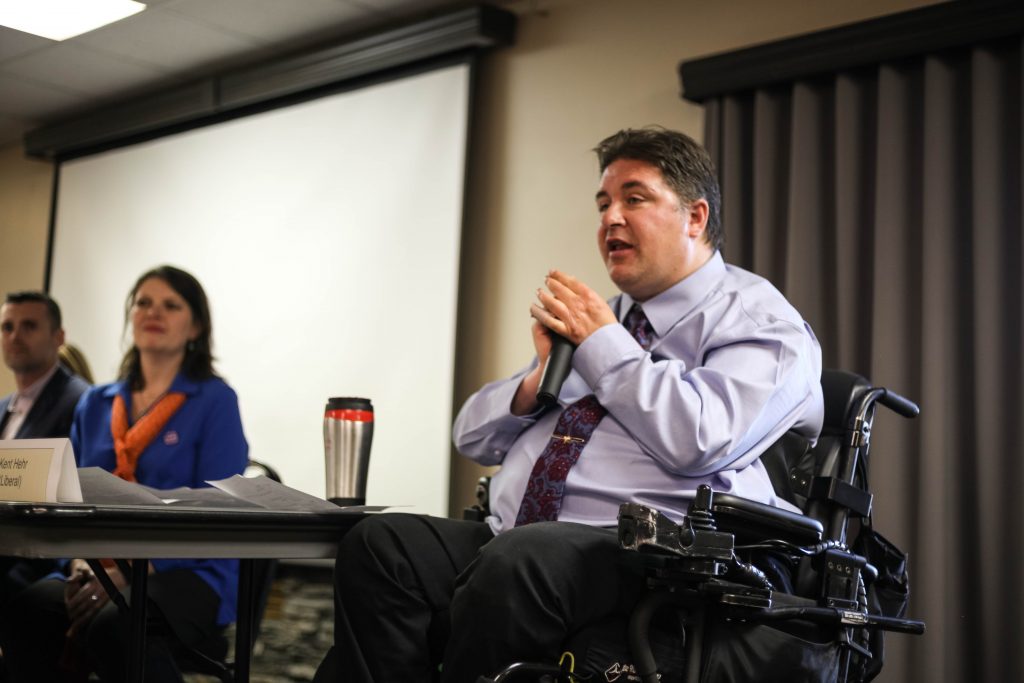
Kent Hehr // Photo by Mariah Wilson
Greenhouse Gases
The first question centered around greenhouse gases — What are the key elements of an action plan that you will advocate for to ensure Canada meets its international obligations to reduce greenhouse gas pollution?
Hehr got the microphone first, explaining how the Liberals have kept to their commitment to the Paris Accord in spite of Conservative governments trying to back out of it, and how the Liberals will continue to follow through. They’re also banning single-use plastics, planting over $2 billion trees and changing the amount of ocean protection from one per cent to 15 per cent , on the way to 30 per cent.
“The NDP has a very ambitious plan to fight climate change,” Buresi began. “We want to invest $15 billion dollars in the climate plan to slash greenhouse gas emissions and also creating 300,000 jobs with that plan.”
The NDP also plan to reduce carbon emissions by 38 per cent — below 2005 levels — by 2030, Buresi says, exceeding current Paris targets. She also said they are considering investing $6.5 billion in public transit and moving to make all public transit electric, and free, by 2030.
Johnston openly admitted he was likely at odds with the others, stating that the PPC’s plan is to withdraw from the Paris Accord, not set a federal target to reduce emissions and to get rid of the carbon tax.
Johnston said, “The point of the carbon tax is to change how people behave, the choices they make. How many people drove here? […] The reality is, the carbon tax is down at a level where it’s not actually altering anyone’s behaviour.”
“We need to end agro-business subsidies,” Gould responded. “What we eat is causing a real problem here.”
Boonlert’s response centered on how current targets are “entirely inadequate and do not go along with the science” — only the Green Party has a hard enough target to ensure real change.
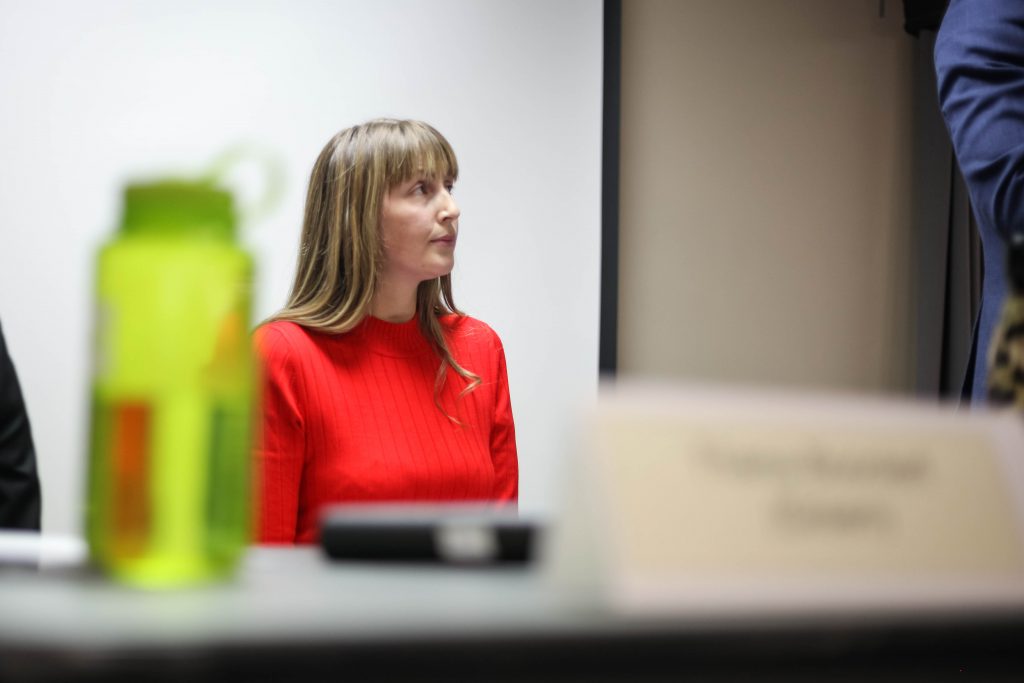
Eden Gould // Photo by Mariah Wilson
Water Pollution and Flooding
Question two was: What can the federal government do to work with different sectors, like municipalities and farmers, to reduce both water pollution as well as the risk of flood events which have been aggravated by industrial development?
Answers to this question were more vague and less developed, with Boonlert suggesting the development of a national water strategy. Gould spoke to how farms leach agricultural and animal waste into water could be stopped and Johnston talked about how fresh water should be managed and monitored as a commodity with fines for water pollution. Buresi emphasized the importance of restoring water protection legislation that Harper removed, paired with banning single-use plastics and holding corporations responsible for pollution. Hehr mostly spoke to how the Paris Accord will be hard to hit, but will be worth it, and how the Liberals’ plan is more achievable than what the Green Party has planned.
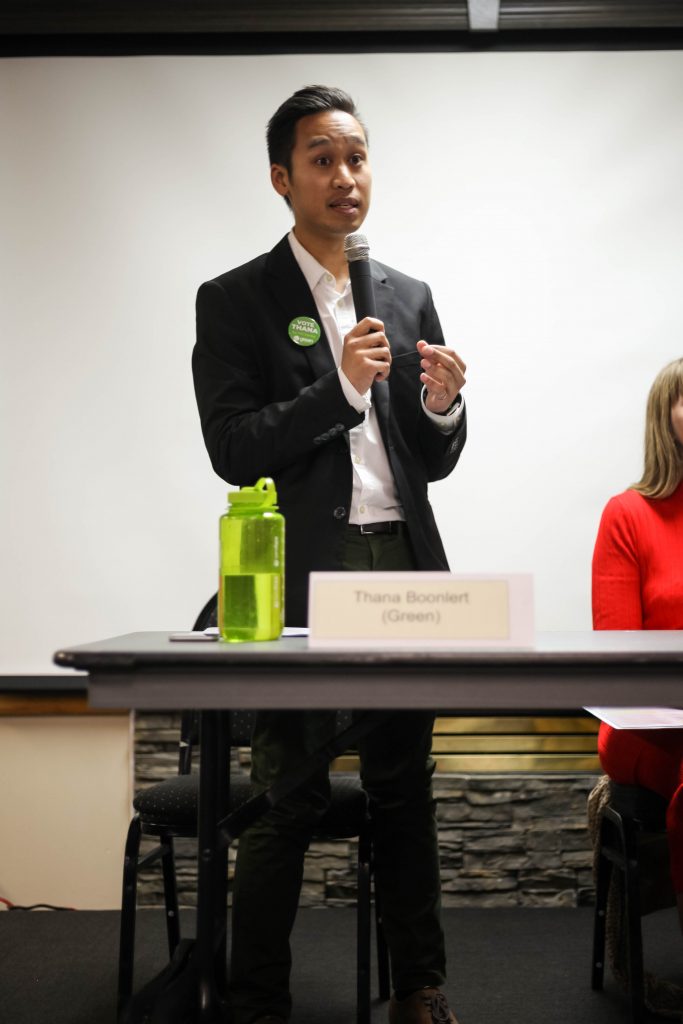
Thana Boonlert // Photo by Mariah Wilson
Wilderness Protection
Question three was: What will you do to protect the quality and quantity of wilderness in Canada? Another tough question that candidates were able to better address than the previous one.
Johnston answered first, focusing on the importance of management of land: “Step one is maintaining the parks that are in place in Canada, focus on land management practices […] there’s increase in forest fires — that’s a management problem. We need to implement practices like controlled burning.”
Responding next was Buresi, who thoroughly explained that the NDP would work with Parks Canada to create more protective spaces and urban national parks in addition to creating Indigenous guardians program, local food hubs and a food waste strategy.
Hehr’s response focused on the Liberals’ devotion to protecting the ocean — boosting protection from one per cent to 15 per cent, aiming to protect up to 30 per cent by 2025. Protecting wildlife reserves and implementing environmentally-aware national housing strategies would also ensure the wilderness remains protected.
Boonlert said the Green Party would increase federal funding on endangered species protection, incorporating Indigenous-led protection and conservation programs, fund stewardship of water and land and fully restore the Canadian Environmental Assessment Act to pre-Harper era strength.
Gould stated that having more protected land for animals and aiding endangered species are at the top of the APPC agenda to create a “more peaceful and compassionate space.”
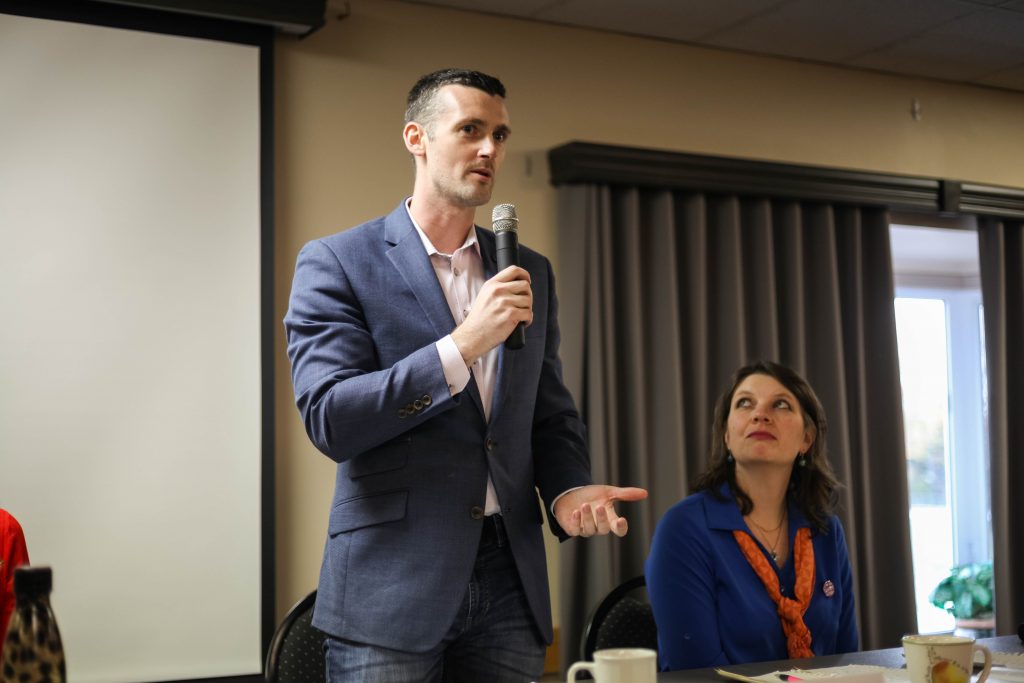
Chevy Johnston // Photo by Mariah Wilson
Toxic Substances
The final question was: What will you do to ensure that Canadians are better protected from the health and environmental impacts of toxic substances?
Buresi responded first.
“We would make sure that there are many regulations in place that control companies and how they get rid of their waste, in addition to fines for polluters,” he said. “We would commit to the Canadian Environmental Protection Act and the Pest Control Products Act.”
Johnston agreed that the PPC would hold businesses accountable for pollution, as well as ensuring there is transparency surrounding food product regulations and violations.
“Something else we need to do is legislate the use of mitigation products,” Johnston continued. “One example is nitrogen stabilizers in agriculture […] it’s highly susceptible to leaching into the groundwater and into water systems.”
Going chemical-free and regulating plant growth is the best solution, Gould says, instead of “having a hotdog, which presents the same risk to a person’s colon as having a cigarette.” Taxing plant-based foods less and meat-based products more would also tip the scale to a healthier population.
Regulating micro-fibers as a toxic substance, improving monitoring and reducing use of pesticides and moving towards more plant-based agriculture are all solutions Boonlert sees the Green Party using.
A round of applause was given when Hehr brought up the Liberals’ implementation of the revised Canadian Food Guide. Hiring a Chief Science Officer to evaluate government policy was also a huge move Hehr said, in addition to banning export and sale of asbestos and reviewing the Canadian Environmental Protection Act.
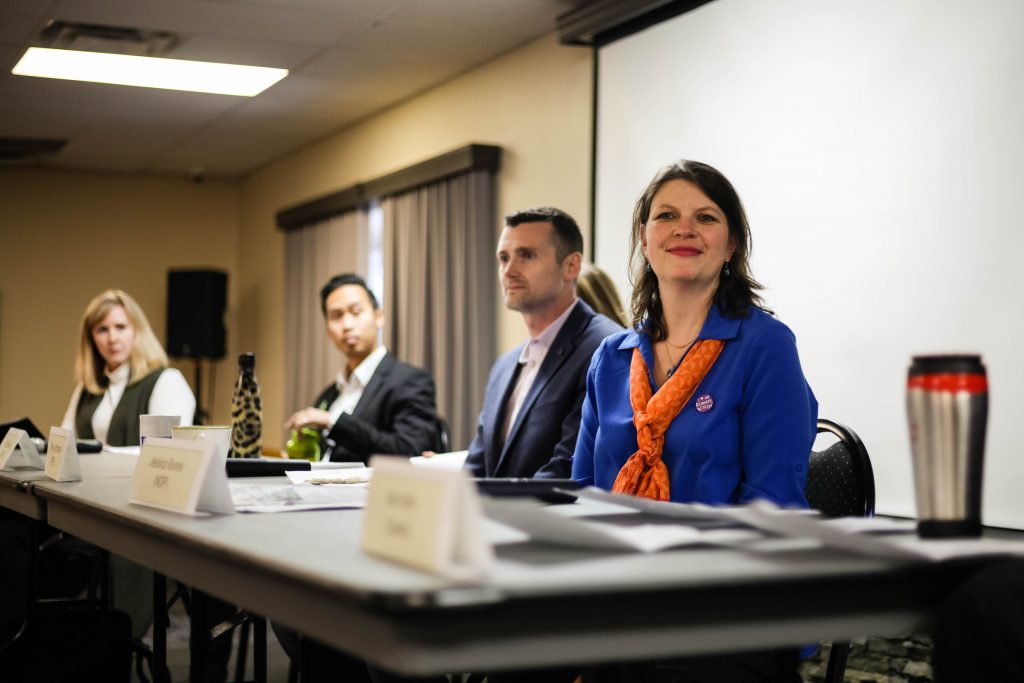
Jessica Buresi // Photo by Mariah Wilson
Open Debate Period
The next part of the forum welcomed the five candidates all at once to debate what they would do to protect and assist workers in current fossil fuel industries as we diversify our economy.
Boonlert jumped to the microphone to suggest Canada follows the Dutch model — retraining workers to the new industry while providing a livable income during that transition from fossil fuels to green energies, a suggestion that earned the audience’s applause.
Buresi followed by agreeing with Boonlert, bringing up how the Iron and Earth group are oil workers pushing for retraining and transition to cleaner energies, and are an example of how that is really happening.
Hehr liked the emphasis on retraining, adding that education is a key component in addressing the environment — through ensuring post-secondary education is affordable, retraining can be possible for oil workers to adapt to new environmental standards. Boonlert agreed, pointing out that the Green Party would work to eliminate tuition fees completely — Buresi and Gould quickly interjected that their parties believe in that too.
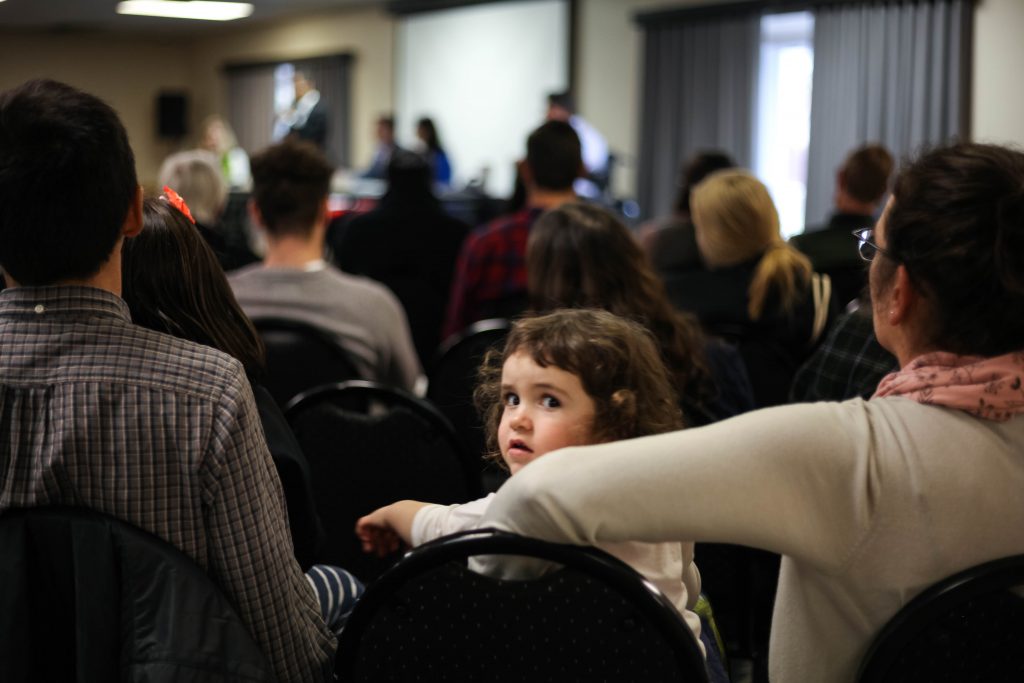
Photo by Mariah Wilson
Audience Questions
The first question regarded the importance of consulting with Indigenous peoples — to which everyone responded with enthusiastic agreement that transparency and fair consultation are key. Boonlert added that he has been advocating for the Green Party to propose a reserved seat specifically for Indigenous peoples, which received an applause.
The second question was about inspiring innovation and technological development. Johnston started by saying that industry usually solves most of those problems, and that nuclear power is a viable energy route that innovation should focus on. Boonlert said that creating legislation to more quickly pilot green projects would ensure greater development, and Hehr talked about how accessing geothermal resources from leftover oil wells is a valuable resource.
Holding businesses accountable for pollution was the third question topic, Johnston being the only outlier with a dislike for the carbon tax and rebates.
The fourth was asking about a timeline for transitioning from fossil fuel energy to greener energy, and answers stuck generically with “as soon as possible.”
The final audience question was about what security plan for food do parties have. Gould spoke about how 50 per cent of food grown goes to feeding animals, and so by not eating animals there will not be a food crisis. Boonlert referenced Hehr’s earlier mention of geothermal resources and how they can be tapped to sustain year-long greenhouses. Johnston said that global warming will be increasing crop yield, though added that it’s problematic. Buresi said the NDP has plans for creating local food hubs, a food waste strategy and reinforcing food banks. Investing in other communities and ensuring we create a network of sustainability was what Hehr said the Liberals would like to focus on.
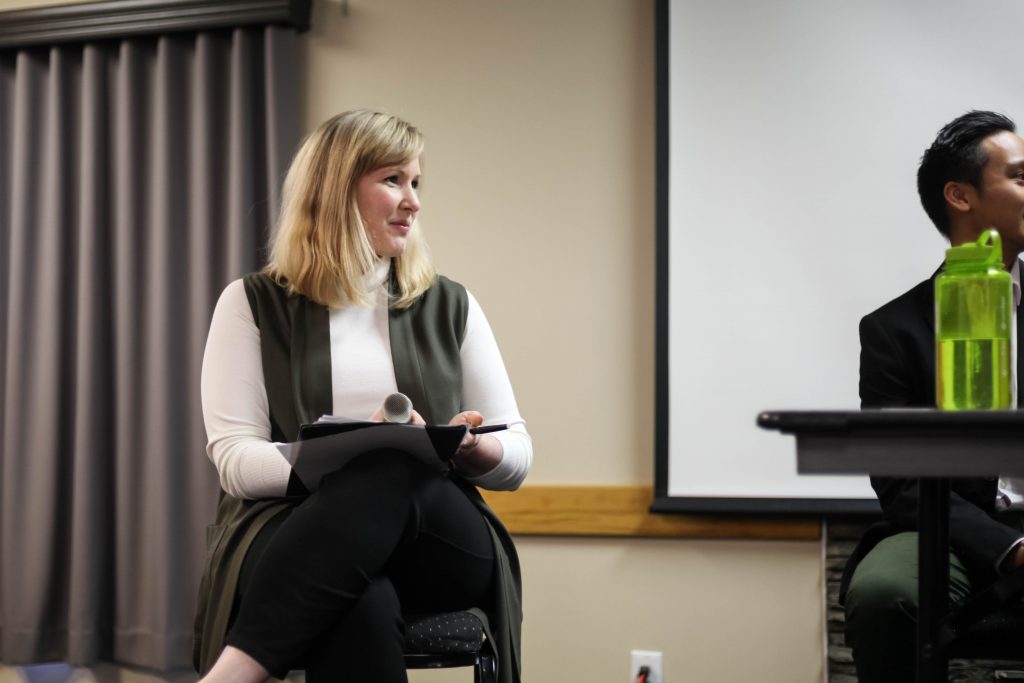
Photo by Mariah Wilson
Closing Remarks
“We know that climate change is real, and we are taking concrete actions,” Hehr began his closing statement. “We have a plan that is going to meet our Paris climate change commitments. We are 75 per cent of the way there after only 4 years.”
Hehr added that putting a price on pollution, banning single-use plastics and protecting oceans are all Liberal platform points they are delivering on to make it an ambitious but achievable commitment.
Buresi said, “The NDP is committed to fighting climate change and reducing greenhouse gas emissions. Rachel Notley was amazing, probably the best premier. It was the only time growing up here that I was really proud of my premier. She has a proven track record in making bold moves — she brought in the carbon tax.”
She continued to say that we need to start thinking about the collective — “We have to start thinking of the whole, instead of us individually and our own personal benefits. That’s something I don’t think is talked about enough because maybe it sounds like communism or something, but instead of our own petty needs, what does the whole community need?”
Buresi also said to an applause, “We need to stop blaming China, and stop blaming other countries.”
Johnston focused his closing remarks on looking at climate change from a “realistic” perspective through withdrawing the carbon tax.
“I agree, we need to make decisions founded in science,” he continued. “But claiming that we’re going to end the human race or be on an unlivable planet if we don’t make changes to our lives in the next decade is disingenuous.”
“We need to vote like our lives depended on it,” Gould began, “because our votes do. The Animal Protection Party of Canada is willing to work with any organization or group with goals aligning to help animals, humans and environment protection.”
Gould went on to explain how one of the easiest solutions is to become vegan. She called out members of the crowd for laughing at her.
“If we don’t defeat [climate change], our future will be terrifying and short,” she said simply.
Boonlert started with lauding his fellow candidates for showing up.
“I think the biggest non-winner here tonight are the candidates who aren’t here that were invited,” he said. “The biggest loser tonight is Greg McLean, because he had his opportunity to come here, talk about climate change, talk about what his stances are on the environment, and he did not show up. That’s a massive disappointment,” he added during a large applause.
Boonlert continued by explaining how times are changing and we live in a society where focusing on capital growth is no longer sustainable.
“We must buy this, buy that. At some point, when do we say it’s too much? [Capital] growth is not sustainable on a planet with 7 billion people on it,” he said, adding how one of the government’s flaws is being made up mostly of politicians. “If we bring scientists into parliament, we start looking at the facts. We need to make science the ceiling of how we govern.”
The conclusion of the forum was marked with rounds of applause for all of the candidates. Remember to cast your vote on Oct. 21 and inform yourself about the candidate platforms in your constituency.
